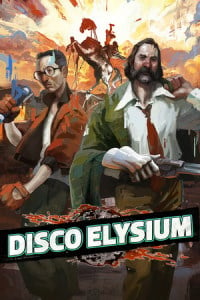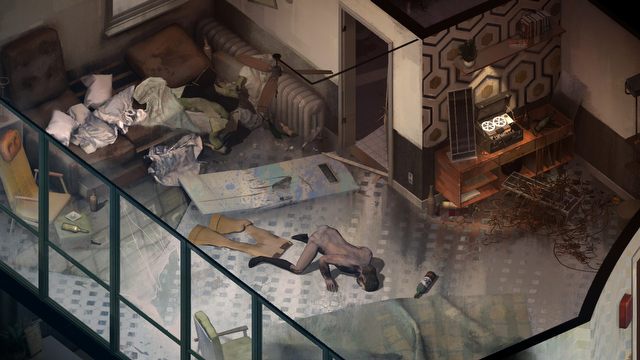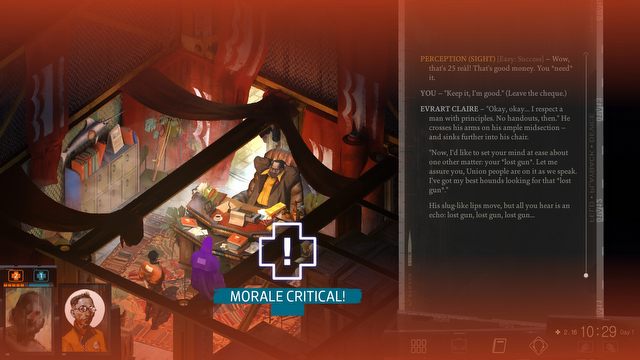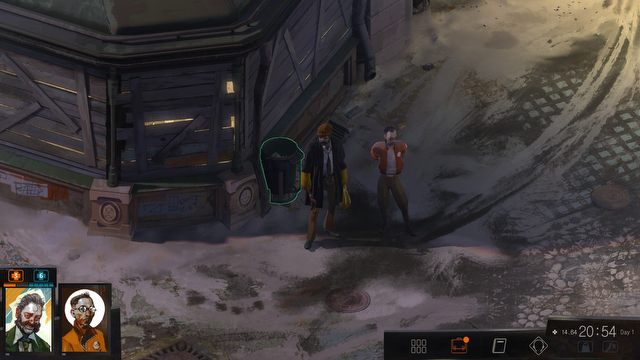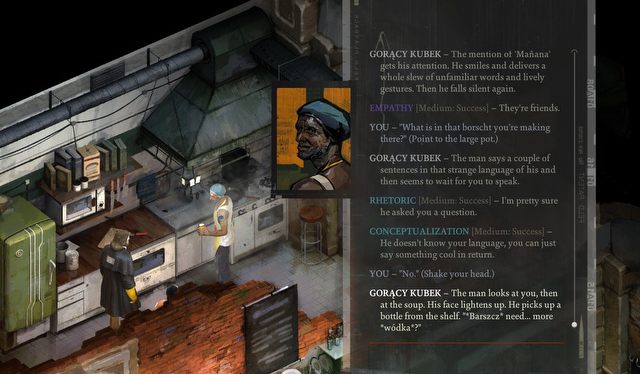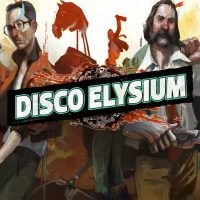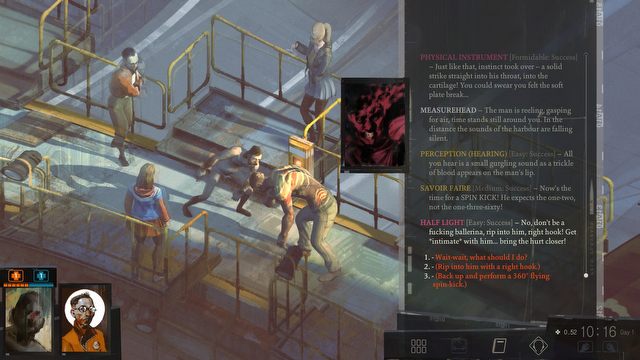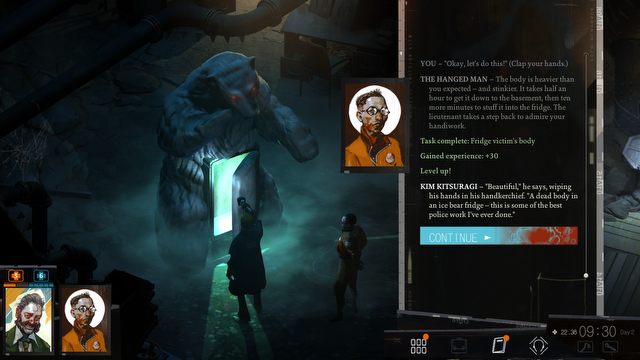Meet 2019's Most Amazing Game – Disco Elysium, a Quirky RPG from Estonia
[Review updated] A depraved cop investigates a degenerate industrial world, where racism is ubiquitous, the specter of communism fuels class struggles, and the good and evil are meaningless constructs. Disco Elysium, this year's most ambitious RPG
The review is based on the PC version.

There is nothing. Only warm, primordial blackness. Your conscience ferments in it – no larger than a single grain of malt. You don’t have to do anything any more.
- truly phenomenal writing – both of dialogs and descriptions;
- a unique world that subtly reflects many modern problems;
- remarkable atmosphere;
- unmatched role-playing options, unprecedented archetypes of the main character;
- a fascinating, clever story with a thoughtful, concise composition;
- expressive and relatable characters (both main and secondary);
- original gameplay mechanics with a unique character development system;
- fantastic graphics with an artistic touch;
- a rich soundtrack that creates a great atmosphere;
- pretty good (though occasional) voice acting.
- the story is rather linear;
- the success of the hero's actions is too heavily dependant on dice rolls – the player rarely has the opportunity to demonstrate any skills.
These are the first words you will hear. Blackness truly surrounds them – there is nothing, only the letters. But the Ancient Lizard Brain that pronounces them is wrong. You'll have something to do in a minute. There will be the roar of a motor coach passing under the cafeteria and you will wake up – you will be brutally dragged out of the warm black. You've had your time. It's astounding it happened so late, really. Nothing could break you out of sleep. Neither the frosty air drafting in through the window that someone (I wonder who?) knocked with a shoe, nor the cursing, drugged kids on the backyard, not even the workers picketing at the gate of the nearby dockyard.
In any case, after the sudden awakening, you will not remember anything – where you are, what you're doing, what's your name. And above all – where's this monstrous hangover coming from. But don't worry about it. Your new partner, lieutenant Kim Katsuragi, who has just arrived – will quickly clarify the situation. In the cafe's backyard, a hangman's been swinging on the tree for the past week. Nobody know who's responsible for his ominous presence, but you, detective, have been assigned to solve the case – the orders come from precinct 41... Actually, this is your third day on the scene... but instead of gathering evidence and questioning witnesses, you were busy dumping your memory by chugging booze and sniffing anything you could get. But this ends now.
Time to find the shoe, put on your talking tie (what?), and start looking for answers. Who's to blame for the death of the hangman? Where did you lose your badge (and weapon, but let's not mention that)? Why does almost everyone in this filthy neighborhood look at you with disdain? And why the fuck are you such a mess?!
DISCO ELYSIUM IN NUMBERS:
- a million – the game contains that many words (let that sink in);
- thousands – that many skill tests are done during the game;
- 100 – that many tasks/items waiting to be completed/received;
- 70 – that many partially voiced characters inhabit the town of Revachol;
- 30 to 60 – completing the game takes about this many hours (according to devs);
- 24 – that many abilities define the hero;
- 5 – for that many years Disco Elysium was developed (plus over a dozen for the conception of the universe).
UPDATE AND FINAL VERDICT
*sigh of relief*
I really wanted to explore the game thoroughly. I absorbed it slowly, in small portions, enjoying every minute I spent with it – every click and every bit of text I read. And my God, is that game good. And I'm really, really sorry it's already over.
As I already mentioned, Disco Elysium harks back to Planescape: Tormentem (the devs from ZA/UM don't hide that game's strong influence). In the end, however, it turns out to be – to my taste – a superior game. A small Estonian developer the audacity to do what the big corporation, Interplay, did not dare to. Completely oblivious to the ruthless laws of the market and the iron principles of RPG design, they trusted their guts and shivers and created a work of art instead of a game. Nothing more, nothing less.
In the classic Torment, philosophy is an important addition to the adventure, but merely an addition nonetheless – it's a game unable to provide entertainment without such elements as fighting crowds of faceless enemies, fighting powerful bosses, and collecting magical swords +6. Disco Elysium does not accept trade-offs – it takes all these, supposedly mandatory RPG elements, and throws them out the window.
There is only the story. Only talking to NPCs, exploring, engaging in inner dialogue with the protagonist's own furies – and, above all, role-playing. And it's not only done in a way that sets the new industry standard – it's also perfectly coherent and subordinate to the story, not encumbered with anything that could be redundant. On top of that, it's not set in an abstract, escapist fantasy, but in realities close to our own, reflecting our own problems in a crooked mirror – the philosophical, political, social, psychological, and whatever-you-want – problems that we know from history or even from our own, present-day, socio-political backdrop.
Unfortunately, this piece of art is not devoid of certain defects. I was a little tormented by the mechanics that determine the success of any action of the hero almost exclusively through dice rolls and rarely give the player an opportunity to exercise their own competence (especially intellectual). Worse, in the end, the story turns out to be strongly linear, almost completely devoid of significant branches – it's pulled towards the finale on a single thread. There was even one time, when I got completely mad on Disco Elysium – I found that I had almost no influence on the course of a certain dramatic situation, and the game even goes as far as to falsifying the ability checks in order to bring me to a predetermined sequence of events. But that anger lasted no more than an hour. Promptly giving way to the returning, ungodly delight.
The malicious types might call the game from ZA/UM a visual novel rather than an RPG. Let them, it's their loss. I want to emphasize: this game is the perfect point in case that video games can be art. Not a product of "electronic entertainment," but an artifact of culture to match traditional literature. Difficult in reception, sometimes tiring – but also bloody emotional, tearful, deeply introspective. And also dignifying to the entire industry, which can look cinematography in the eye with increased confidence, able to take its own stand in the debate about artistic forms of expression. And as if that's not bonkers enough, this game is the doing of a small group of crazy, passionate Estonians. Hats off, ladies and gentlemen, hats off!
Wakey-wakey, detective...
That's how Disco Elysium begins. The game is serious, clever, morally ambiguous and, in principle, without elements of the supernatural – albeit full of fantastic, bizarre and often quirky themes or situations. This is an RPG that's one of the most unusual, ambitious and intriguing representatives of the genre released the last decade, if not more.
It's very reminiscent of the immortal Torment, even though it does its own thing in all aspects. It's an RPG that doesn't really quite fit the definition of an RPG... in any case, not according to our usual set of prerogatives defining this genre.
Let's take combat, for instance. There's none in Disco Elysium. Of course, conflicts arise quite often since the protagonist, as befits a policeman, mettles with other people's affairs, stays around shady individuals, and, from time to time, finds himself in dire straits. But forget about random encounters with random enemies. Forget traditional turn-based skirmishes, or the active pause, using strong and fast attacks, and obtaining deadlier weapons.
ACCORDING TO ANN
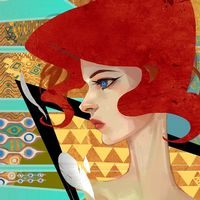
After a few hours of Disco Elysium, my hero is dressed in crocodile shoes, yellow bell-bottoms, a mesh t-shirt (+1 to drama!), a police raincoat, and a fedora. Taking the pants and shoes off greatly increased his chances of jumping over the fence without breaking his legs. Jumping with his ass naked came naturally to him, because my hero is an absolute loser. Some time earlier, while trying to avoid paying off a debt, he rammed a woman in a wheelchair.
As you can see, the first hours of Disco Elysium is a wild ride. I can't wait to see what happens next.
Ann "Kalevatar" Garas
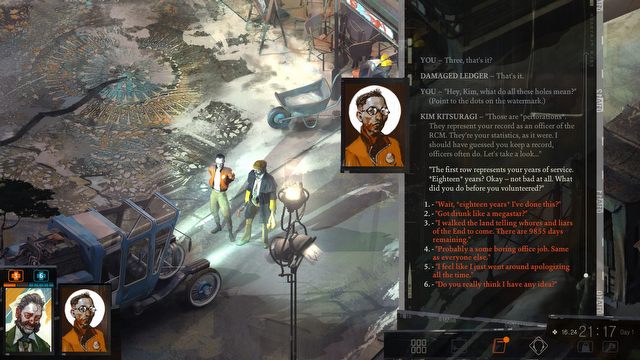
A rockstar cop, an apocalypse cop, a boring cop or an apologetic cop? What type of cop are you? (Notice the nice, dynamic shadows, too).
Let's say that you spurred an open conflict. First, I would like to congratulate – it's not an easy task in Disco Elysium. What happens next? The entire "combat" sequence will be resolved through dialogue. The game describes events – or rather the things that cannot be seen by looking at the otherwise sufficiently detailed 3-D character models – and gives the player choices precisely tailored to the conditions.
Here's an example: You decided to enter the yard by force and knock out the muscle, who stands in your way. This begins with a hard test of strength. You roll the dice... Success! The chic animation shows the bouncer getting punched in the throat and bending to his knees. Time stops for a moment, and a dialog box appears, offering further options: a right hook, or a spin-kick? If in doubt – the game will pronounce the inner voice of the protagonist (actually one of the voices) and offer you the best solution after testing various of his skills. And so it goes.
...we have a city to burn...
Perhaps you're now under the impression that the game is a paragraph, text-based adventure. Well... The ZA/UM studio did what they could to avoid that. We spend a lot of time on typical exploration of the environment, full of interactive objects. The perspective is isometric, and the actions of the protagonist are accompanied by neat animations (really, their number is remarkable for a game of this type), and the voice acting is really good. The whole is complemented by a nice color palette and good visual effects.
All this, however, doesn't change the fact that Disco Elysium is brimming with text. Well written, clever, bright, superbly constructed, with a specific atmosphere with a touch of black humor here and there, but nonetheless – in quite terrifying quantities.
People that choose high psychosocial abilities for the protagonist will be most affected by that. In Disco Elysium we spend more time engaged in inner dialog that chatting to NPCs. There are 24 different skills available – and the tests of this skills, performed with every other sentence, are responsible for the lion's share of the text in the game.
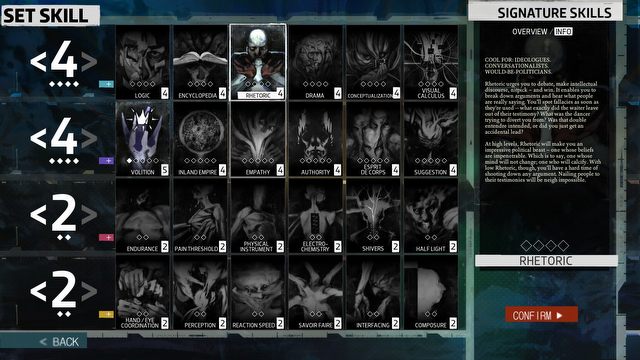
The character tab can be intimidating – don't fret! Character creation and development are completely painless.
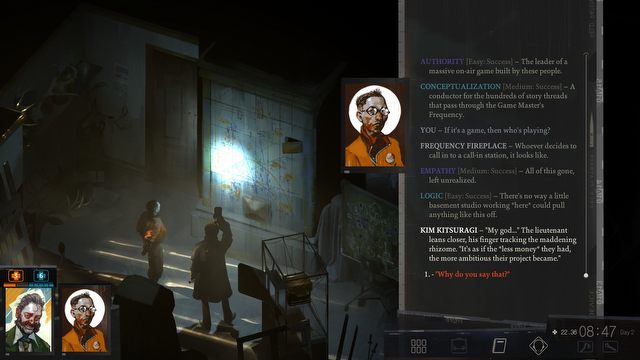
One of the locations you can discover is an abandoned development studio where Fortress Accident used to make RPGs.... Try asking your uncle Google what ZA/UM was called a few years ago.
Each "skill" is a kind of a separate voice in the hero's head (remember the talking tie?), and each of them has something interesting to add, even during the blandest conversation on interaction with the environment. If that bothers you, consider that ZA/UM did not follow the footsteps of inXile, and – differently than in Torment: Tides of Numenera – tried to avoid overwhelming the player with too large chunks of text. Here, the messages are short, embellished with different colors and graphical elements to make a bit sexier – in the end, however, the amount of text may give you a headache.
But it's not a huge issue when the quality is alright. The writers demonstrate rich vocabulary, coming up with some fun metaphors, and serving some pretty specialized language from different areas. Then, there's the setting. Before developing the game, the members of the studio spent several years (!), creating a universe of Disco Elysium during RPG sessions – and this really paid off. Reading about all the nations, races, important figures and events can make you dizzy. ZA/UM can be proud of the universe they created – still, the sheer amount of text can be overbearing.
WHO THINK, DO NOT ERR
The uniqueness of Disco Elysium is also pronounced in character development. We have more traditional elements, such as allocating points to skills with every level-up, or improving the overall statistics with items (clothes), but there's one aspect that sets this game apart form other representatives of the genre. This is the study of thought. Through dialogue – both with other people and (or above all) with himself – and interaction with the environment, the hero learns various concepts that he can ponder over later.
"Hey," says one voice at some point. "Wanna build communism?" This is exactly how it looks during the game. I should also add that the game follows the conversations closely, and adds up how often the hero voices Communist views, honors the free market, goes about moralizing others, or acts like a xenophobic bigot. It's a truly diabolical design that takes role-playing characters to a level unprecedented in the RPG.
But back to the subject – having unlocked one of these ideas, we can open the right window in the UI, place it in a free slot, and start to internalize it. It's worth going through the whole list. The advanced theory of races, socio-economics, or the agenda of feminism are just a few of the many intriguing questions that the protagonist can delve into. When a certain amount of time passes and the process is over, the hero receives various bonuses for his skills. However, the process also brings about some debuffs. One of which, not a very tangible one, is the fact that you can't unthink a thought.
...or does the city has a detective to burn?
Someone maay ask, "Can't we just ignore parts of the text?" Fair point. Disco Elysium, in some respects, resembles a point-and-click adventure game. The game world is limited to one of the districts of the city Revachol. The locations are rather cramped, and practically everything there – from characters, to items, to decor – has been placed with purpose. The plot is a very compact, too. It revolves around the murder case, which, expectedly, has ever wider implications, but it basically brings the entire game to a single "main quest."
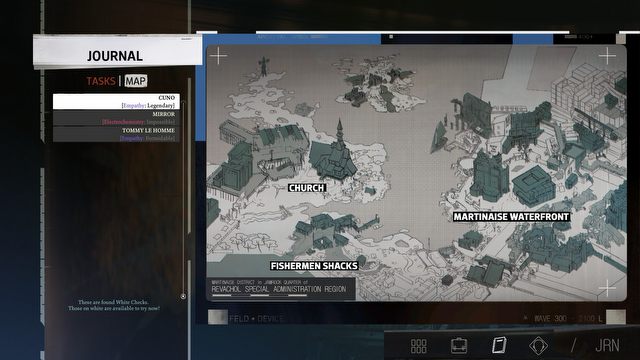
The game world is not big, but very, very condense. And we don't get a map just like that – we have to fix it up ourselves.
You won't even be doing traditional side quests; all the cases that have the seeming of side activities can introduce new threads to the investigation. On top of that, there are elements of non-linearity. The creators gave us some freedom in formulating conclusions based on the collected evidence, in search of subsequent next clues, and numerous problems have more than one solution. Simply put, ignoring any information is impractical, because everything may be relevant. More – it's even advisable to be rather meticulous with reading all the descriptions.
Unless you don't care about a successful conclusion. Disco Elysium offers a lot of room to maneuver for the character's personality; nothings prevents us from sealing the fall of the protagonist, leaving him in the same mess as we find him in – if not worse. And then, if you really don't feel like reading a lot, you can simply create a dumb brute – playing such a character, you will only see the basic descriptions of things, and there will be little pondering over serious matters. You'll miss one of the most important aspects of the game, but...
No truce with the furies
When I'm trying to come up with creations that I could compare Disco Elysium to, I see three games. The first two I already mentioned: Planescape: Torment and Torment: Tides of Numenera. ZA/UM, like the Black Isle studio, following in the footsteps of inXile Entertainment, used the formula of an isometric RPG to create something completely different than most representatives of the genre. The authors almost completely eliminated combat, and subordinated the character development system to the story telling, which is the absolute foundation of the game. Moreover, the story involves themes and ideas straight from serious literature, rather than electronic entertainment. By extension, they've elevated their work to nearly high culture – hence contributing to ennobling the entire medium of video games. And they deserve high praise for that.
And the third creation I'd compare Disco Elysium to is The Infinite Jest from late David Foster Wallace. The book is considered an outstanding piece of literature, belong to the gems of American prose, a mandatory reading for anyone claiming to be a man of words. At the same time, it's definitely not an easy read. Even if you're not afraid of lush sentences and vocabulary that could be challenging for the most literate person, it wouldn't be difficult to feel intimidated by the sheer volume of the thing And it's similar with Disco Elysium. It's a wonderful game that every fan of the RPG genre – even every player looking for something more than empty entertainment – should get to know themselves. Remember, however, that reaching the finale may be mentally exhausting.
ABOUT THE AUTHOR
Completing Disco Elysium took me slightly more 60 hours. I could do it in 30-40 if I read faster and/or would spare myself the painstaking clicking through everything that offered any interaction (including dialogue options)... but why should I deny myself this bliss?
This game has been on my radar ever since it was still known as a project called No Truce with the Furies. And this is one of the rare cases, where all the hopes I had for the game were realized, and all my concerns – dispelled. Which is nice, because I had a few of them – after all, an obscure game from an even more obscure Estonian studio without a strong portfolio could easily go wrong.
DISCLAIMER
We've received a PC review copy of the game from Dead Good PR, who cooperate with the developers of Disco Elysium – kudos!
Disco Elysium
Meet 2019's Most Amazing Game – Disco Elysium, a Quirky RPG from Estonia
[Review updated] A depraved cop investigates a degenerate industrial world, where racism is ubiquitous, the specter of communism fuels class struggles, and the good and evil are meaningless constructs. Disco Elysium, this year's most ambitious RPG
